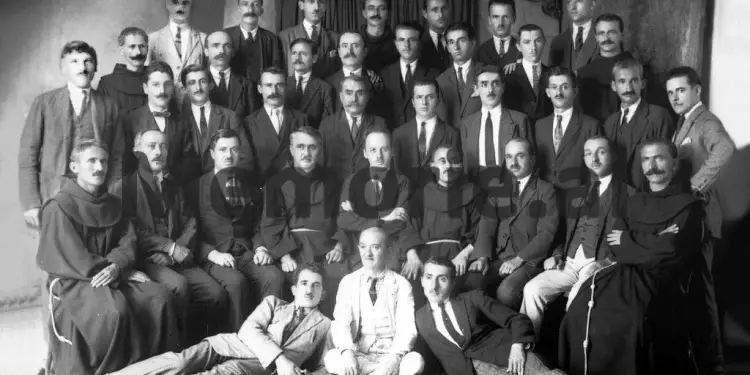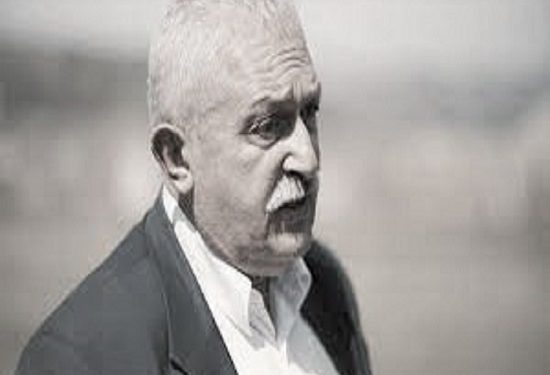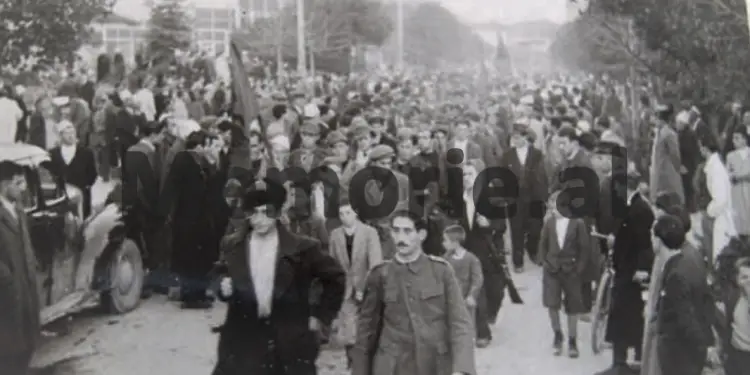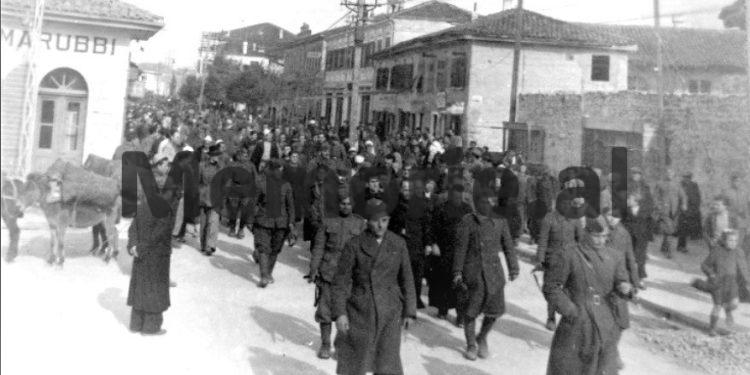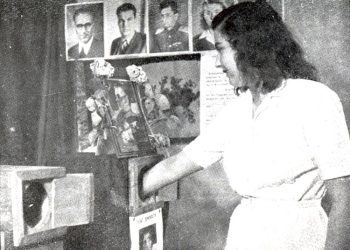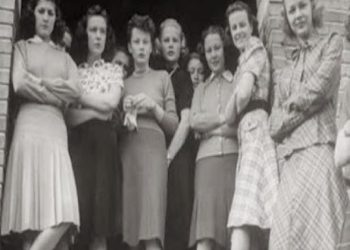By Marcel Hila
The fourth part
“SHKODRA IN THE YEARS OF THE ESTABLISHMENT OF THE COMMUNIST DICTATORSHIP, 1945-1953”
Memorie.al/ From the beginning of this article, I wanted to emphasize that we must take for granted the fact that: those who came to Shkodër on November 29, 1944, were military troops who had been placed behind the invading armies, to drive them out of this country. As the liberation is accomplished, the military force, as soon as it completes its mission, as is usually the case everywhere, must be demobilized and its men sent to their homes. But this did not happen to us!
Continues from last issue
The implementers of the ideology do not even try to hide the evil, justify it, but proudly carry it out and brag about it, calling the crime a victory. They remember that they are performing a great service. Therefore boasting is part of their psychology, impudence is the virtue they pride themselves on. This is communism, a crude attempt to explain society. And like the surgeon who, instead of using a delicate scalpel for an intervention, communism uses a butcher’s cleaver. Everything that is more subtle in the psychology of a man and in the structure of a complex organism, he reduces to only the economic process. The human being is only matter. It is characteristic that communism has so few arguments. Then sophisticated theories are not worth it for him, but only the stick, the prison, the concentration camp are valid.
Communism has admitted itself that it rejects any absolute moral conception. It deals with the idea of good and evil as indisputable categories. For communism, morality is relative, it is class morality that counts and should be followed only. Even killing, yes, yes, even killing, killing hundreds and thousands of people, can be considered a good thing, according to the political situation. It depends on the ideology of the class. But who defines this class ideology? The answer is simple. The wealthy class, the working class and the peasantry. But the prosperous class, the working class, the peasantry cannot come together and come to a meeting to judge what is good or bad. And then, how do we solve it? Of course, it will be a small group that will decide it, just like the deputies who are the delegates of a good people. It is these representatives who decide who to keep alive and whom to send to the grave. A minority gets the attributes to decide for the majority. It is the party, the decision-making aristocracy. The crimes of a few receive the demonic justification of being committed for the benefit of a great, very great majority.
So here we come. That decision of the small group – which claims to be the mind and heart of the Working Class, which decides who to keep alive and whom to take to the grave – which decision is made in the name of some ideas. The group transforms these ideas into ideologies. Ideology justifies evil, gives it the status of a right thing. It was ideology that attacked Shkodra. She estimated that her social body
Needed to put 4,000 people in the grave and 14,000 more in prisons. How did his heart do?! We said it because ideology creates genocide in the name of great ideas.
“The new world must be built”! Enver Hoxha ordered. “The area and the city must be cleaned”! – replied Shefqet Peçi! Very big goals! “Man” – says Solzhenitsyn, – “in order to do evil; he must feel it as a legal and well-thought-out action.” Human nature requires a justification for the actions it will perform. Ideology is the justification of evil. Macbeth’s fear of losing his throne is too selfish, petty, and ridiculous.
Ideology solves the problem. It not only does not make you feel guilty, but guarantees that you are at the service of the people. But she looks for the hard-hearted, the evil-doers. Ideology even provides us with praise. Because it serves a very large mass: the class. The Nazis with the race, the Jacobins with the ideas of the revolution and the Communists with the justice of the dictatorship of the proletariat remember that they are serving the nation then, and the succeeding generations in the future. Therefore, in the twentieth century, it was ideology that acted on large masses and created a million human casualties.
Wrongdoing is indisputable. Can we say that evildoers do not exist? Who destroyed the innocent people? The masqueraders, the criminals, the miscreants. Without them, the regime would not have existed. Communism cannot be understood without the cruelty of Enver Hoxha, without the criminal hypocrite’s members of the Politburo, without the prison directors, without the sadistic investigators, without the merciless prison policemen, without the heartless judges and so many others. And in Shkodër, how many names can we find? All twenty-four carat masquerades. Why are they in these positions? Because time called for the mean. It was not for nothing that Enver Hoxha asked the People’s Protection Section, as early as December 1944, to mobilize people without schools, preferably without any training, that is to say, lowly people, nurseries of ignorance that are easily put in the service of crime.
But who resists communism? Who can overcome him, for we saw him fallen, defeated and dragged away! Communism, with all its unimaginable aggressiveness, has a weak point; it has its Achilles’ heel: it retreats only if it finds an invincible will, of even just one individual. When a man decides to stay until the end, without fear for his life, communism here shows his weakness. Why? Because it cannot defeat him, even if it kills him. Before this man, communism is broken. And when you remember that these wills, while they were going to be killed, sang and when they were in front of the firing squads, they forgave their enemies, those who had arrested, massacred, condemned and now were killing them.
Before such types, communism is over. Therefore, a stance had to be taken, a decision, not a pose: the victim had to be prepared for the sacrifice. These challenged communism, these put the pickaxe to it, and these demolished the walls of its castle. I am very sure that even from our Shkodra, these guys have challenged communism, disarmed it, taken away its striking power, and humiliated it. Communism has fallen from these. These are the heroes who took him down, not in 1990, but many years ago, on the very day they decided to reject him. And they rejected it not only because of the power of the ideas they had, but also because of the virtue of faith in God. Therefore, communism has a great fear of faith in God, because only this faith gives strength to the victims to stand.
A character of Solzhenitsyn in his book ‘The Gulak Archipelago’ utters these words: “You are strong until you take everything from a man. But this man from whom you have taken everything, he is no longer in your hands, he he is free, because he has realized that he is not alone, he is not the master of his life, he is not its creator: he has a Creator!”. We must say that people, thanks to this conviction, have realized that they cannot be slaves to anything in this world, neither to their desires, nor to power, and that’s why they resist.
This purpose gives these types a strong and stable “un” in all circumstances. In communism there is no place for chance. He does not exist, on the contrary, there are signs that you must understand and follow. We are called to great things because we are called to walk our lives in freedom. Such people you can take away their lives, but they can disarm the executioner by giving them the gift of their being. This sacrifice of life has a much greater meaning than welfare and social prestige. These people have known and accepted in their depths a God, from whom they expect salvation and help.
When the creature arrives here, it has passed many painful paths and labyrinths, and after this arduous path, only the solemn overcoming of pain and humiliation awaits it. Here he takes on the status of a martyr, which is the highest expression of human dignity. I am very sure that the city of Shkodra and the area produced many of these dignified colossus martyrs.
But who were these opponents of communism? They are the intellectuals, the honest, the learned, the clergy, art owes a lot to these people, and Albanian literature owes them. She would be doing a great service if she turned them into artistic figures. That art which centers on the martyr is missionary. The pain that leads to the sublime sacrifice reflected in art is the greatest expressive force of beauty.
This art was missing and unfortunately, it is still missing today. Although in freedom, our uninhibited writers can sit down and put the events of the heroes on paper. They look for us, they call us, we owe them a lot. We owe them the example they gave us, the strength of resistance they passed on to us, the ideas they passed on to us, and their high morals, which they raised to the standard.
They are also the family members who, when they saw that the way of conveying values to freedom was closed, transmitted them through the family. Because, here comes the natural question: who saved the soul of this city and this area? Who came to the defense, when every source of light was cut off and when the darkness attacked? Only the family. She opposed a whole regime, a system. Family! Many in number, it became a University without rectors, without headquarters, without lecture halls, without libraries, without well-known professors, without anything! The family scattered and spread from street to street and neighborhood to neighborhood.
She took on the unique and unrepeatable task before in history: to vaccinate the individual, to protect her creature. She took up the task of speaking, not from the school chair, but from the closed domestic room, away from all prying and dangerous ears. She said: “Don’t, be careful, don’t cooperate, don’t speak, don’t surrender, don’t tell, don’t trust them, don’t love them, don’t hesitate, and don’t feed illusions”! These words spoken in the form of an invitation and an order, a lesson and demand, every day, many times a day, in many houses, in many neighborhoods, endless repetition, this was the protective food.
Therefore, more with gratitude than boasting, we must say that such meetings take place in this city and are completely absent in other areas of the country. The family there did not speak. Even if he spoke, there were very few minds that knew the truth, brave mouths, and attentive ears. Therefore, this country suffers, because the family did not speak, did not protect, did not vaccinate. And we still have today, masses wandering here and there, people who are sold for a job, people who sell votes.
Therefore, even today, freedom is delayed to be felt as a need, therefore a compromise is made with yesterday’s usurpers who have changed their names, there is a perversion of ideals, betrayal by the lowest political ranks with the consequence of personal humiliation, as funny as it is dramatic. Because whole masses are without yeast, without vitamins, without strength. They are the individuals without those “don’ts” whispered millions of times in Shkodër. But don’t I mean by this that we are alone? No, because ours is a kind of solitude that does not depress us, but rather honors us, rather. The height to reach is a big thing, with the consequence that, when you reach the top, you are alone. A noble solitude.
What luck that Albania has a city with this special University, whose teachings do not grow old and its leaven does not grow old. It has retained a magical youth. The family had no books of conservatism of philosophy to offer, lectures of political science of democracy and fundamental charters of human liberties, but only these small, daily and very potent pills.
The thoughts of Shkodra, by virtue of these lectures, given a long time ago and numerous in number, deeply embedded in the sub consciousness of freedom-loving generations and already passed on to other generations to come, are the thoughts of Albania, what must life, that of the future. Therefore, the whole country owes to this family, these families as a whole. It depends on when they will wake up and realize it.
Therefore, I am of the opinion that in the “Black Book of Shkodran Communism” a blank page should be written for the family. She has performed a great service and we must not forget this. It has successfully carried out this mission: the birth, growth, formation and salvation of the individual of our city. Its merit is indisputable. Our gratitude is indispensable. Memorie.al




